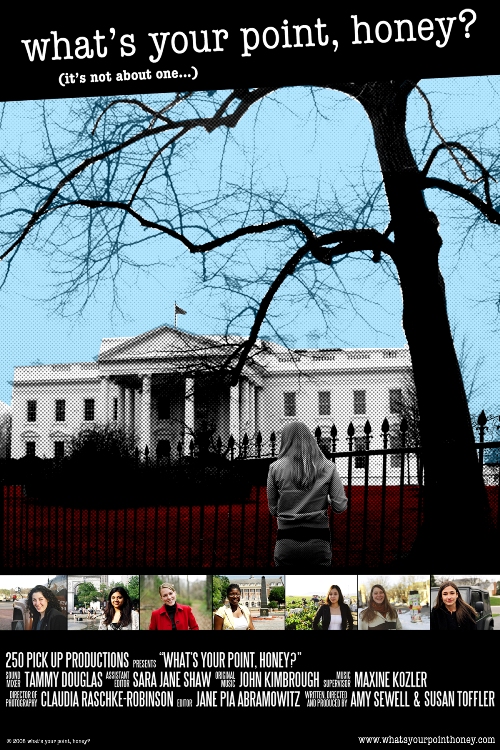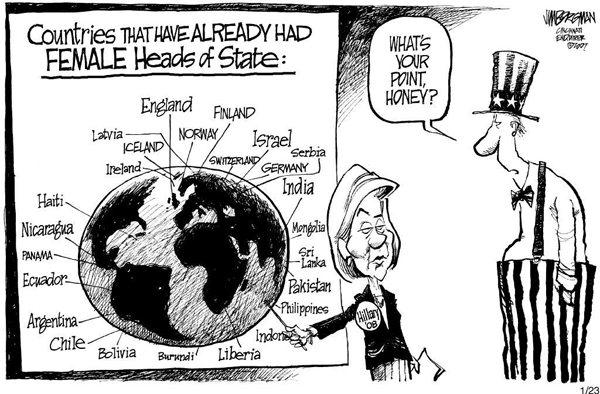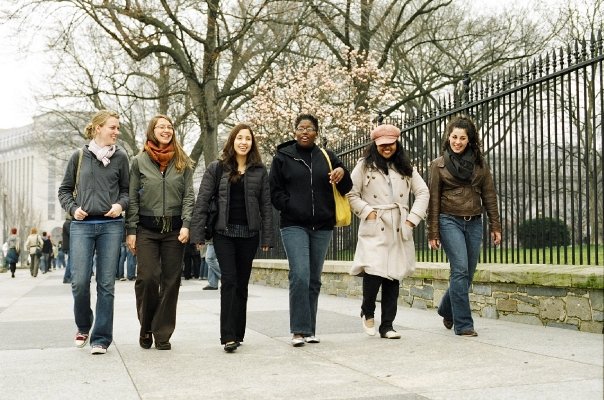Prepping Women for the White House
What’s Your Point, Honey? Promotes Not One, But Many Women Leaders
Nearly 100 years after universal suffrage, U.S. women have yet to hold the highest office in the land. Currently, they make up 18 percent of governors, 16 percent of senators and 16 percent of representatives. What's being done to change these statistics? Filmmakers Amy Sewell and Susan Toffler confront this question head on in their upbeat feminist documentary, What's Your Point, Honey? Through candid and formal interviews with pre-teens, prominent women leaders and everyone in between, the directors have created a film about and for young women who dream of doing great things.
Long before Hillary Clinton's bid for the 2008 Democratic presidential nomination and Sarah Palin's selection as John McCain's vice presidential running mate, groups like the White House Project and CosmoGIRL!Magazine's Project 2024 were working to help young women get involved in politics and reach the highest levels of elected office. What's Your Point, Honey? explores the landscape and follows the journey of several young would-be presidential hopefuls.
Grooming a Female President
Meet Jen, Sonali, Cat, Patrice, Agxibel, Margot and Lexie. In What's Your Point, Honey?, they are the newest "class" of girls chosen for Project 2024, an initiative launched by CosmoGIRL! -- a lifestyle magazine aimed at young women -- to train a new generation of women leaders and ideally, help elect a woman to the White House by the year 2024. Project 2024 pairs the girls for a summer internship with women who are leaders in their field.
As feminist Gloria Steinem notes early in the film, as a young girl she could imagine becoming a writer or a Rockette but never the president, because "I never saw that." The film underscores this with a scene in which three fiery girls between the ages of 8 and 12, with more confidence and doggedness than many grown men and women, storm their playground and the streets of New York probing the thoughts of their peers and the public: "Would you vote for a woman?" "Why do you think there hasn't been a woman president?" Children and adults alike seem confounded by the questions. When asked, "Will we ever have a woman president," one classmate responds, "It might just be a miracle or something."
For Marie Wilson of the White House Project, that's precisely the point; young women need role models in order to feel that their dreams are within reach: "Numbers matter. If you put one woman here and one woman there, they're tokens and they have to be ‘man' enough for the job. But if you put lots of women in, then women can be themselves."
A New Generation of Leaders
When director Amy Sewell first heard about Project 2024, she admits she was skeptical: "At first I thought, ‘Whew, a CosmoGIRL in the Oval Office?'" -- referring to the magazine's reputation as a glossy trendsetter -- "and then I thought, ‘Hey, any way we can get there!'" Sewell also notes it's also about "diversity and the reality that, guess what, our first woman president may not be white and blonde."
On the official Web site for What's Your Point, Honey? visitors are invited to watch video profiles of the girls and vote for who they'd like to see as president. Recently, I.M.O.W. followed up with the film's main participants to discover how their internship experience has affected their political aspirations.
"I really do think I'll run for public office someday, starting small and then going big," commented Patrice Woods, of Rockville, Illinois. Jen Abraczinskas told us, "I hope that in my life I will either run for public office or serve the public as a member of our government." Sonali Gupta is keeping her options open: "I would be interested in running for public office someday. I cannot ever rule out the option of running for president."
While not everyone envisions life as an elected official, Project 2024 did strengthen most of the young women's interest in public service. For Agxibel Barajas, "I am committed to serving my community and I intend to do so at the local level. I think I can have more of an impact."
Cat Wilson of Charlotte, North Carolina agrees: "I am certainly passionate about politics. I see that a lot of change needs to happen, and I want to help." Lexie Miller adds, "I'm going into law school with the expectation to go into public service....[Project 2024] certainly solidified that goal."
But as the film's subtitle, "It's not about one..." reminds us, it's not just about getting one woman to the top position, but shifting the political climate so that, by the time these young girls are of eligible running age, it will "be so normal for women to run that we'll never look back," according to The White House Project's Wilson.
Summing up the challenges and importance of the road ahead, film participant Margot Presley puts it best: "I know that I could run for office successfully. An issue for me and for so many women, I'm sure, is confidence. My advice to myself and to others is to go for it. It will never be the ‘perfect time' and we'll never have the 'perfect background,' but nor will any of the men we'll come up against! One day, when we are surrounded by equal numbers of powerful women and men leaders, everyone will recognize without question that women can and should strive to be brilliant and compassionate leaders."




